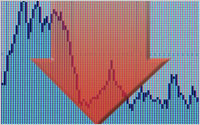 Consumer spending growth slowed in
the U.S. in April, while comparable spending in the UK fell by the sharpest percentage in almost a year.
Consumer spending growth slowed in
the U.S. in April, while comparable spending in the UK fell by the sharpest percentage in almost a year.
According to payment processor and spending tracker First Data Corp., year-over-year spending growth by U.S consumers in April
reached 5.7%, which was down three percentage points from March when spending was up 8.7%.
Transaction growth also slowed to 5.8% in April, down from 9.3% in March.
advertisement
advertisement
According to Silvio Tavares, senior vice president and division manager of First Data
Global Information and Analytic Solutions, April spending was impacted by an earlier-than-usual Easter, “plus the unseasonably warm weather in February and March, which pulled forward seasonal
demand.”
Despite the slowing
growth, First Data’s SpendTrend report characterized April’s discretionary spending activity by U.S. consumers as “healthy.”
It’s a different story in the UK, however, where the economy has technically
entered another recession, according to data compiled by Visa Europe. Spending fell 4.3% last month versus April 2011, the steepest fall in 11 months. On an annualized basis, spending in the country
is down nearly 7%. There was a 2% dip in consumer outlays from March to April of this year, per the Visa Europe data.
Steve Perry, commercial director, Visa Europe, characterized the April drop in UK consumer spending as
“surprisingly large.” Perry added that the “dismal weather clearly had an impact on retail sales and unlike last year there was no Royal Wedding to buoy the month’s consumer
expenditure.”
On a rolling
three-month basis, Visa Europe’s Expenditure Index for the UK “highlights a deteriorating picture for consumer confidence,” Perry said.
Chris Williamson, chief economist at Markit, the London-based financial
services firm, said: “Consumer spending remains under pressure from a considerable list of headwinds, including high unemployment, widespread job insecurity, low pay growth, high inflation and
high debt. As such, it would be surprising to see any pick-up soon.”